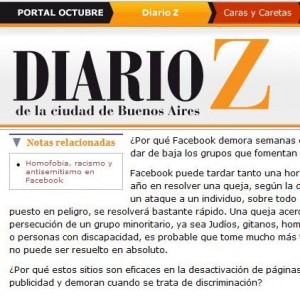 Originally published in Spanish as: Interview with Andre Oboler, Diario Z, 19 May 2010
Originally published in Spanish as: Interview with Andre Oboler, Diario Z, 19 May 2010
Interview with Dr. Andre Oboler, co-chair of the Working Group on Anti-Semitism online for the Global Forum for Combating Anti-Semitism.
Why does Facebook takes weeks or months to terminate groups promoting hate?
Facebook can take any where from an hour to over a year to resolve a complaint. It depends on the complaint. An attack on an individual, particularly if it threatens violence, will usually be resolved quite fast. A complaint about persecution of a minority group, be it Jews, Gypsies, homosexuals, or people with disabilities, is likely to take much longer – and it may not be resolved at all.
Why are these sites effective when it comes to deactivating other sorts of pages and slow when it comes to discrimination?
Facebook is an American company. Statements by staff at Facebook have indicated they wish to apply US law and try avoid the local law in other countries. Under US law, freedom of expression is more important than preventing incitement to hate. Under US law a defamation case must be against an individual, or a group of people not exceeding 25. This means inciting to hate because of homophobia or racism is not seen as a crime. Under US law, incitement against a group only becomes a crime if it crosses into incitement to immediate violence against the group. The US position is unique and stands in sharp contrast to the position in countries like the UK, France, Italy, Germany, Australia, Canada and others. In these countries it is incitement to hate itself that is seen as the problem.
Is it the same with YouTube?
You Tube has similar problems, but it also has a more detailed reporting process. On YouTube more material is being uploaded, and more material is being removed. Like the fight against racism itself, the hate can’t be stopped, it can just be removed as quickly as possible. Some have suggested there is no point removing it, because it will just be put back. This is wrong. Each time it is remove it comes back at a different address. This makes it harder for it to become popular and to spread. For this reason alone it should always be removed as quickly as possible.
What can users do?
Users should report any problematic content they see. They should also keep a picture of the problem as evidence. To take a picture of the screen, hold the shift key and press the button on the keyboard that says “print screen”. You can then go into a word document or an image editing program, paste the picture, and then save the image or document. This can then be shared with authorities or non government organisations who work to fight hate.
What can the community do?
Community organisations should teach people, particularly students, how to report problems. Half the problem is people deciding to ignore racism and hatred. If everyone stands together against online hate, companies like Facebook will accept that the community expects them to work harder to prevent hate. It will become a higher priority.
In Argentina, the citizen has to file complaints in person and this delays the process, what do you think of this?
Complaints should be reported online. They should be reported both to Facebook and to independent monitors, either from the government or from non government organisations.
How come social networks seem able to act immediately on intellectual property, but not on hate?
The short answer is money. Companies spend a lot of money to protect their copyright. No one is currently investing large sums of money into solving the problem of online hate, racism and discrimination. I have spent five years trying to convince people of the importance of this problem, and each year the problem gets more urgent. Slowly governments and the media are starting to pay attention… but it is very early.
